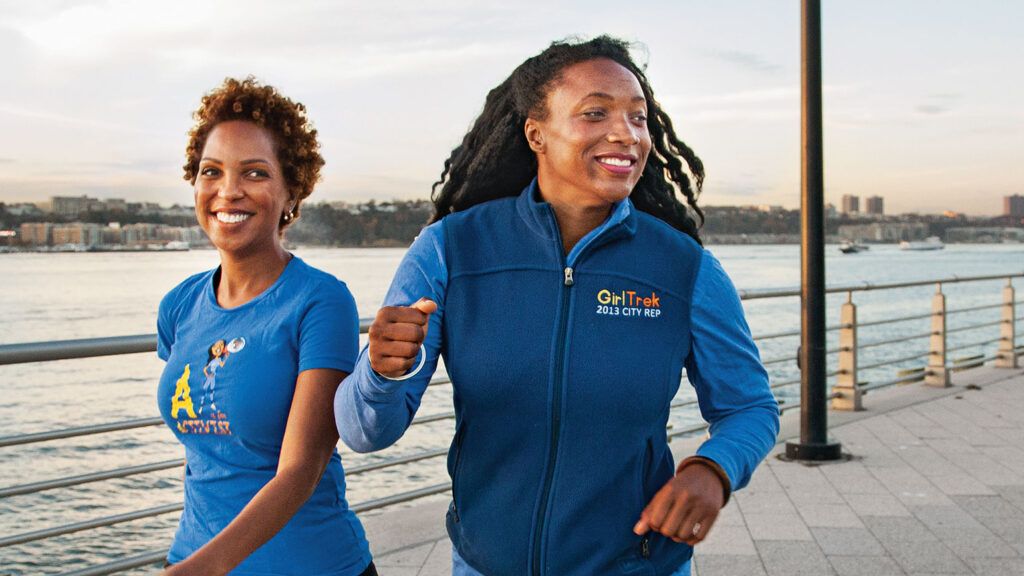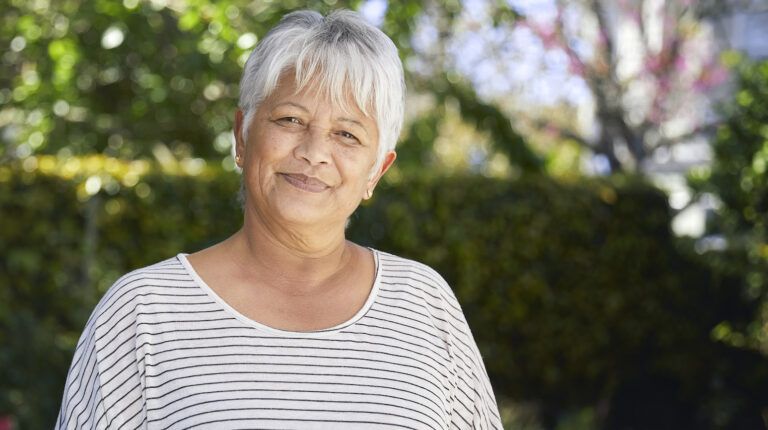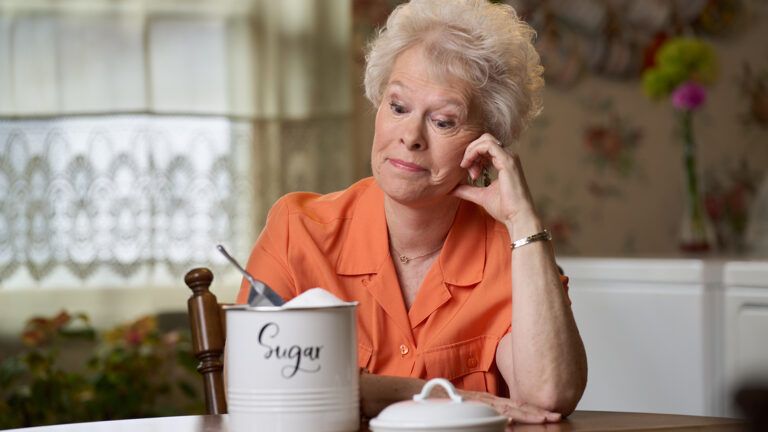God, guide my steps. I say that prayer nearly every day, as I lead groups of women on hikes through the Rockies, address policymakers at the White House, or give interviews on radio or television. I’m a cofounder of GirlTrek, the largest health nonprofit in the country for Black women and girls.
Our national grassroots movement inspires Black women to live their healthiest, most fulfilled lives. I ask God to guide my steps because he’s brought me so far.
From the outside, it must have seemed like I was at a high point back in 2009. I was in my late twenties, a first-generation college graduate, a Teach for America alum who’d moved up to a leadership position for a large charter-school network.
BROWSE OUR SELECTION OF PERSONAL GROWTH BOOKS
I was doing work that mattered—serving as a history teacher and administrator at a middle school in Bridgeport, Connecticut, where the student body was more than 90 percent Black and Latino, and coaching other administrators in the network—and making more money than anyone in my family had ever made.
My grandparents were sharecroppers; my mom desegregated her high school in Oklahoma and worked hard her entire life. They were all proud of me, my ambition and my success.
What my family—what most people—didn’t realize was that I was miserable. I was working with kids I loved, helping turn around failing schools, yet I felt trapped, like I was taking on too much and putting in crazy hours to achieve someone else’s dreams and goals, not my own. Did my only worth come through what I did for others?
The one person who understood was my best friend, Vanessa Garrison. We’d met working at the same investment bank to pay our way through college. We bonded over holding down full-time jobs while being full-time students—Vanessa at UCLA, me at USC.
Even though we were in different cities now—after eight years at Turner Broadcasting in Atlanta, Vanessa was working at a nonprofit in Washington, D.C.—we stayed close by phone. I called her one night after work and unloaded everything that had been troubling me.
“I’m tired all the time. Ain’t no sunshine in Connecticut. I’m depressed. But I can’t just quit my job and be free to travel the world. Who’s going to pay my bills?” My laugh was brittle. “I feel so stuck.” I’d grown up poor and committed myself to making the world a better place. I couldn’t turn my back on that commitment.
“I know what you mean,” she said. “My grandmother sacrificed her own health and happiness to raise me and my cousins, and now we’re going down that same path, doing too much, taking care of everyone except ourselves.”
READ MORE: HARRIET TUBMAN’S INSPIRING LIFE
Because her female relatives struggled with chronic disease, she’d been looking into the health problems of Black women. The statistics were sobering.
In the United States, 82 percent of Black women are over a healthy weight, and 67 percent engage in no leisure-time physical activity. We die younger and at higher rates than any other group of American women, from preventable diseases like high blood pressure, diabetes, heart disease, stroke.
“If we don’t want that to become our future…” Vanessa said.
“…We can’t keep on living like this, I know,” I said. “Stopping doesn’t feel like an option. The work I do feels urgent, revolutionary.” I gave it some more thought. “Well, James Baldwin said, ‘Children have never been very good at listening to their elders, but they have never failed to imitate them!’”
“Exactly! We need to make self-care our revolution!” she said. “Whenever we see something inspiring, we’ll share it with each other. Let’s make it our mission to be happy, to not be stressed, to try to find balance in our lives.”
I was in. Exercise and a healthy diet would help, but what we were facing was as much a mental, emotional and spiritual burden as it was a physical one. It would take God! As the Bible says, “Where two or three are gathered….” Little did we know, our two would become 100,000.
From that day forward, Vanessa and I texted, e-mailed and called each other with anything that inspired us. Poetry. Music. Scripture. Stories of women making a difference.
READ MORE: 10 WEIGHT LOSS TIPS THAT WORK
If history is repeating itself, why not look to our history for change-makers? Freedom fighters! I thought, sending Vanessa links to articles about civil-rights activists like Ella Baker and Septima Clark. The history teacher in me really got into that.
One woman we kept coming back to was Harriet Tubman. Harriet grew up as a slave on a plantation in Maryland, but she escaped in 1849. She became a conductor on the Underground Railroad, making many trips back to Maryland to guide hundreds to freedom.
I was so moved by Harriet’s courage that one cloudy Saturday I drove down to Bucktown, Maryland, to the Brodas plantation, where she was born. I parked my car, stepped out and looked around.
On one side of the road were the fields where she had labored. More than 150 years later, a descendant of the Brodas family sat upon a tractor working the land. On the other side stood a tiny information kiosk.
Nearby was the yellow-and-white Bucktown General Store, where a 12-year-old Harriet refused to help an overseer stop an enslaved man from escaping. It was her first recorded act of rebellion.
The overseer threw a two-pound weight that hit her in the head, causing her lifelong headaches and seizures, along with powerful visions that she believed were revelations from God. I had to get inside that store! But there was a padlock on the front door. I saw a woman nearby and called out to her, “Excuse me, ma’am, could you let me inside?”
It turned out she was the wife of the great-great-great-grandson of the original plantation owners. She took off the padlock and opened the door. I was immediately transported to the nineteenth century. From the items that lined the shelves to the potbellied stove in the center of the room, everything looked the way it had in Harriet’s day.
I moved from the doorway to the counter, ran my fingers along the dusty glass of a display case. Harriet Tubman stood here, I thought. Right where I’m standing.
That was when it struck me: Though incredibly heroic and righteous in the face of oppression, Harriet Tubman wasn’t some mythic being. She was a flesh-and-blood human being, an ordinary woman who, one step at a time, walked her way to freedom. That was it! If Harriet could do that, I could walk my way to health and well-being, couldn’t I?
READ MORE: GIRLTREK HELPS WOMEN WALK WITH GRATITUDE
Vanessa and I came to a decision. We would walk to heal ourselves. To free ourselves from suffering depression, disease and early death.
I did more research on the health issues facing Black women. A report from the Centers for Disease Control and Prevention concluded that unless their diet and activity levels changed, African-American girls born in the 2000s have a 55-percent chance of getting Type 2 diabetes. I was shocked. These were the girls I was teaching!
Of course I needed to teach them about the Civil War and Reconstruction, but that didn’t seem as urgent to me as modeling healthy behavior for them, teaching them habits that they could carry through their whole lives.
I started by going hiking every Saturday morning and taking 20 of my middle-school girls with me. Sometimes parents and other teachers would come, and we would do lessons on health and well-being while walking in the woods.
I admit, at first I was as ambitious as usual. I thought I’d start by walking, then work my way up to running a 5K. But something happened when I got outside and walked. The pace of the world slowed down.
I became more aware of my body, of the vibrant world around me—a new bird’s nest, asters poking up through the ground, the breeze whispering in the trees. More aware of God’s abundant grace. It felt like I was breathing it in with each breath of fresh air, letting it heal the damage that my belief in the superwoman myth had done to my soul.
I remembered the passage in Psalms, “For you formed my inward parts; you wove me in my mother’s womb. I will give thanks to you, for I am fearfully and wonderfully made; wonderful are your works, and my soul knows it very well.”
Vanessa told me that she too was feeling a new lightness and joy from walking. “Now we need to bring other women along with us,” she said one day. “Show them how good it feels to take care of themselves.”
READ MORE: ONE MAN RIDES FOR HELP
“I’ve been thinking the same thing,” I said. “The girls on my hikes are going home and talking with their mothers about health. But it should be the other way around, the moms teaching the next generation by example. Healthy living should really start at home and be reinforced at school.”
Vanessa had an idea. “Okay, what if we could rally their mothers to walk for change? First for their own health and well-being, then for their daughters’, then for the whole community?”
I took it even further. “What if we could rally a million Black women to walk?”
Vanessa laughed in delight. “Let’s do it!”
We started out small. In 2010 we e-mailed the women in our families and our circle of friends and colleagues and invited them to join us in walking 30 minutes every day for 10 weeks, either solo or in groups, in their own neighborhoods. We asked them to forward the e-mail.
Before we knew it, we had 500 women walking. Not just walking but talking about it. About getting healthier physically, emotionally, mentally and spiritually. About reconnecting with themselves, with other women in their community and with God.
They were so fired up that the following year, they inspired us to issue a national call to action. Vanessa and I knew we were on to something. Walking for change isn’t anything new for Black women. Think about Harriet Tubman. And the women in the Montgomery bus boycott of 1955 and ’56. We were tapping into something culturally and historically significant.
In 2012, Vanessa and I founded the nonprofit organization GirlTrek (the name came from those weekend hikes I took with my middle-school students) to inspire Black women to lace up their sneakers and walk 30 minutes a day.
Tens of thousands of women in cities across the country have taken the GirlTrek pledge to develop the habit of daily walking, to prioritize self-care and to be the change-makers in their own lives and communities. Our neighborhood walking groups are led by volunteers, and we like to say, “We go hard like Harriet!”
READ MORE: HEALING AFTER DIVORCE WITH TAI CHI
We encourage one another to treat walking as a spiritual practice, giving thanks for life every day. Or, as my mom used to sing all the time when I was growing up, “Walk With Me, Lord.”
Vanessa and I never expected to start a health movement by helping each other get unstuck, but now we expect GirlTrek to reach a million members by 2018. I’ve left the front lines of education reform to focus on GirlTrek fulltime. My salary has been cut in half, yet I’ve never felt more alive or had more of an impact on the world.
Being a source of love for my community had to begin with a love for myself. At last I’m finding a balance between caring for myself and serving others. And every day, I ask God to guide my steps.
Did you enjoy this story? Subscribe to Guideposts magazine.




